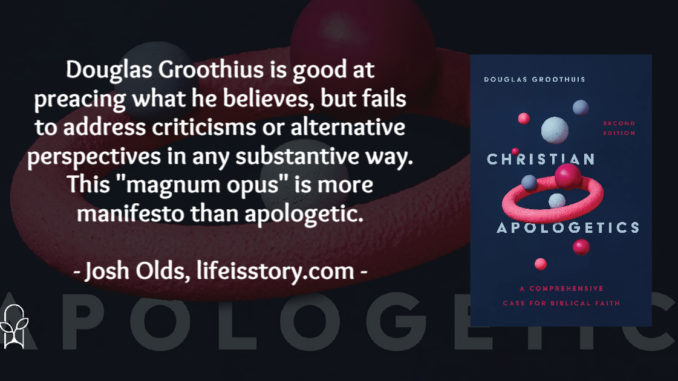
Published by IVP Academic on April 12, 2022
Genres: Academic, Non-Fiction, Apologetics
Buy on Amazon
Goodreads

The Christian worldview proposes answers to the most enduring human questions. But are those answers reliable? In this systematic text, Douglas Groothuis makes a comprehensive apologetic case for Christian theism--proceeding from a defense of objective truth to a presentation of the key arguments for God from natural theology to a case for the credibility of Jesus, the incarnation and the resurrection. Throughout, Groothuis considers alternative views and how they fare intellectually.
An updated edition from the original 2011 text, Christian Apologetics is a massive tome that comprehensively covers apologetics from a classical, evangelical perspective. Douglas Groothius divides the book into three parts: apologetic preliminaries, the case for Christian theism, and answering objections to Christian theism.
The bulk of the work is largely unchanged in substance from the first edition, though references and scholarship have been updated in some areas. Groothius’s work is largely boring—it’s not innovative and not meant to be—and the academic tone lacks the imaginative nature of popular evangelical apologists like Lee Strobel or J. Warner Wallace. At the same time, Christian Apologetics, with its goal of a being a comprehensive overview, lacks the specificity and rigor of other academic apologists like Copan or Craig (both of whom feature heavily in the references). Christian Apologetics therefore ends up giving readers the tone of an academic book while the substance of a popular level book, and it’s, quite frankly, a mind-numbing combination. It’s not that the content is incorrect or that Groothius’s arguments lack validity, it’s that the presentation of those arguments are not at all engaging or compelling.
I also take some umbrage with Groothius’s tone. I understand that apologetics are about presenting a defense of the faith, and in doing so, one is necessarily going to take an “I’m right and others are wrong” approach. But Christian Apologetics often fails to critically engage other perspectives in any substantive fashion. It is good at preaching what it believes; it fails to address criticisms or alternative perspectives in ways that actually engage in good faith.
Groothius also does a disservice to his work by updating the text to include sociocultural apologetics and not just classical, theological/philosophical apologetics. In the chapter “Distortions of the Christian Worldview—or the God I Don’t Believe In,” Groothius misrepresents or caricatures several criticisms of evangelical Christianity. In so doing, he also reduces his definition of Christianity to a particular type of evangelical Christianity. This is no longer an apologetic of Christian orthodoxy; it is an apologetic of white conservative evangelicalism.
For example, in the section on Christianity and sexual identity, he begins by saying “Christians have been accused of being homophobic and generally hostile to those who do not adhere to traditional morality—that is those fitting the LGBTQ+ category.” This sentence alone belies the inherent homophobia and hostility he’s implicitly claiming isn’t true. He does no work to either defend his position or address faithful Christians who have come to believe that texts that seemingly speak against same-sex behavior do not have loving, consensual, monogamous relationships in mind. Instead, it is a poorly-written culture war screed that simply assumes moral rightness.
Groothius also addresses the contention that Christianity is sexist, but again avoids any real substantive discussion of church history, instead (rightfully) pointing to the work of women in the early church—but conveniently ignoring the way women in evangelicalism are often treated. Groothius addresses Christian imperialism and violence by basically invoking the Crusades and saying, well, the Catholics did that, not the Protestants, so don’t blame us. It’s poor scholarship, poorly argued, poorly written, and poorly presented—and it reflects poorly on the rest of the book.
All things taken together, Christian Apologetics is a book to read if you want to understand a white, American evangelical defense of white evangelicalism. The term “Christian” is the title doesn’t mean the full scope of orthodox Christianity, but the very particular subset of American evangelicalism. If you understand that, then Groothius gives a solid example of what that looks like.
